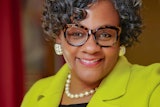What better way to kick off a Friday morning than by witnessing many Black intellectuals enrich the knowledge community and maximize their positive impact as Nelson Pham
Nelson Pham
The HBCU STEM US focuses on exploring and sharing the narratives of HBCUs through convergence research for our benefit and that of the nation, thereby chronicling the tradition of excellence in STEM education at Historically Black Colleges and Universities. This initiative fosters innovation in education and attracts many doctoral candidates from STEM fields and social sciences. Scholars from various states convened at Morehouse College to participate in discussions and conduct active research to improve the representation of minoritized groups in STEM and address systemic challenges. These challenges encompass implicit bias, restricted access to high-quality STEM education, cultural expectations, and socioeconomic disadvantages. For instance, while African Americans make up around 13.7% of the population, they only represent 9% of those in STEM fields. Similarly, the Latinx community, constituting approximately 19.1% of the population, holds only 8% of STEM roles. Moreover, women, who are about 50.5% of the population, account for merely 28% of STEM positions. These figures underline the disparities faced by various groups.
The Role of Mentorship in STEM Success
Numerous minoritized students, especially Black students, face intricate obstacles in higher education, particularly in pursuing STEM fields. The HBCU STEM US supports these students’ success by cultivating nurturing environments in STEM education and workplaces, appreciating diverse perspectives, and establishing safe, brave spaces. It accomplishes this with initiatives such as the analytic hub, grant proposal workshops, and PEER mentoring programs.
The significance of mentorship must continue to be emphasized. Mentors serve as a vital support system, fostering a growth mindset in individuals. Dr. Brittany Chambers recounted how her mentor encouraged her research, even during her moments of self-doubt. This guidance helped her recognize her identity as a scientist and boosted her confidence in her work, particularly with the help of mentors like Dr. Muldrow. She noted that Dr. Muldrow taught her grant writing, a skill that has proven invaluable in her current position. Similarly, Ph.D. candidate Jaire Clarida highlighted how his mentorship enabled him to travel to South Africa, where he collaborated with social workers to enhance resident welfare. It’s crucial to recognize that marginalized students in higher education require a robust support network that nurtures them and “overflows their cup” (Dr. Brittany Chambers). Mentorship is inherently reciprocal; mentees learn from mentors, and mentors also gain insights from their mentees. Thus, it is essential for everyone involved to remain receptive to giving and receiving love, support, resources, and connections, as no one navigates life in isolation.
The Threats to Diversity, Equity, and Inclusion
Such spaces are crucial in today’s diverse landscape. These networks and services empower Black scholars in STEM and social sciences to succeed academically and beyond. However, the ongoing assault on diversity, equity, and inclusion (DEI) threatens these opportunities and potentially exacerbates the marginalization of those already disadvantaged. Now more than ever, we must persist in our advocacy and support to ensure that “everyone we associate with is thriving in abundance, limitless” (Kelli Prenny from Issa Rae’s show Insecure).
States are enacting laws that limit DEI initiatives, particularly affecting programs designed for minoritized students in STEM. Policymakers against DEI efforts are eroding and reversing the advancements made in racial equity, which makes it harder for educational institutions to support and retain minoritized students. The dismantling of equitable policies removes protections and services that were put in place, further hindering the ability of Black scholars to succeed in higher education and STEM fields. The struggle for liberation persists, and collective action remains essential to fight against hatred.
Call to Action: Strengthening Support for Black Scholars in STEM
If you’re looking to aid in Broadening Participation for marginalized students, consider these starting recommendations:
- Do your research: Investigate ways to increase participation, understand its importance, identify effective strategies, and recognize existing gaps. Be sure to appreciate how vital this work is for marginalized communities.
- Get Involved: Contribute to various programs and initiatives, including HBCU STEM US. Participate by volunteering, forming meaningful partnerships, and providing financial support. Moreover, reach out to these organizations to learn how you can engage with their efforts.
- Support Students: Familiarize yourself with these students, use their names in different spaces, invite them to participate, and ensure they feel acknowledged, valued, and heard. Make sure to extend care and recognize each other’s humanity.
- Create Intentional Spaces: Promote the development of safe and courageous environments where marginalized students can thrive. This also involves having the bravery to advocate for these students and ensuring that no one diminishes or harms them.
While not exhaustive, this list serves as a starting point. Higher education faces significant challenges, and our students bear the brunt. We must protect their academic paths from those who wish to undermine them. This assembly of Black scholars, practitioners, and activists is vital as it fosters an environment where they feel affirmed, empowered, and equipped with essential tools to effect positive change in the world. Such spaces and support networks can be replicated across different fields, requiring passionate individuals to bring them to life.
I felt empowered as I walked through the African American Hall of Fame, knowing these legendary figures paved the way for future generations. Notable names include Mary McLeod Bethune, Juanita Odessa Jones Abernathy, and Frederick Douglass. This feeling is not just aspirational; it reflects real progress. Being privileged to be in this space, I observed firsthand the positive impact already underway. These individuals are legends in their own right. We must nurture these scholars, for they are the ones who will discover cures for deadly diseases like cancer, advance sustainable agricultural practices, and address the energy crisis. Their contributions will undoubtedly change the world, underscoring Historically Black Colleges and Universities’ strength, value, and significance.
Nelson Pham is a doctoral student at Howard University.
















